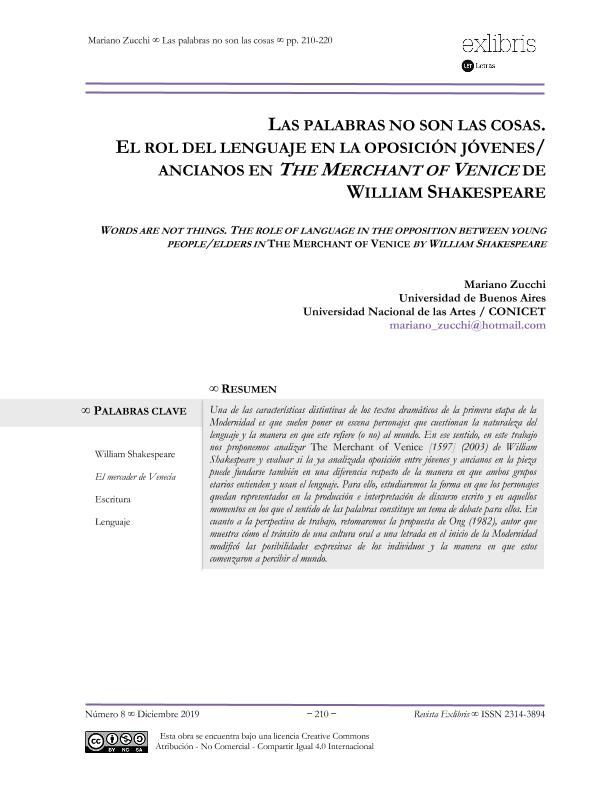Mostrar el registro sencillo del ítem
dc.contributor.author
Zucchi, Mariano Nicolás

dc.date.available
2022-11-01T11:34:28Z
dc.date.issued
2019-09
dc.identifier.citation
Zucchi, Mariano Nicolás; Las palabras no son las cosas: El rol del lenguaje en la oposición jóvenes/ancianos en The merchant of Venice de William Shakespeare; Universidad de Buenos Aires. Facultad de Filosofía y Letras. Departamento de Letras; EX-Libris; 8; 9-2019; 210-220
dc.identifier.issn
2314-3894
dc.identifier.uri
http://hdl.handle.net/11336/175754
dc.description.abstract
Una de las características distintivas de los textos dramáticos de la primera etapa de la Modernidad es que suelen poner en escena personajes que cuestionan la naturaleza del lenguaje y la manera en que este refiere (o no) al mundo. En ese sentido, en este trabajo nos proponemos analizar The Merchant of Venice [1597] (2003) de William Shakespeare y evaluar si la ya analizada oposición entre jóvenes y ancianos en la pieza puede fundarse también en una diferencia respecto de la manera en que ambos grupos etarios entienden y usan el lenguaje. Para ello, estudiaremos la forma en que los personajes quedan representados en la producción e interpretación de discurso escrito y en aquellos momentos en los que el sentido de las palabras constituye un tema de debate para ellos. En cuanto a la perspectiva de trabajo, retomaremos la propuesta de Ong (1982), autor que muestra cómo el tránsito de una cultura oral a una letrada en el inicio de la Modernidad modificó las posibilidades expresivas de los individuos y la manera en que estos comenzaron a percibir el mundo.
dc.description.abstract
One of the distinguishing characteristics of the dramatic texts of the first stage of Modernity is that they usually stage characters that question the nature of language and the way in which it refers (or not) to the world. In this sense, in this work we propose to analyze The Merchant of Venice [1597] (2003) by William Shakespeare and assess whether the already analyzed opposition between young people and elders in the piece can also be based on a difference with respect to the way in which both groups understand and use language. In order to do so, we will study how the characters appeared in the production and interpretation of written discourse and in those moments in which the meaning of the words constitutes a subject of debate for them. Regarding the perspective of work, we will use Ong´s Oralidad y escritura. Tecnologías de la palabra (1982) as a framework, text in which the author shows how the transition from an oral to a literate culture at the beginning of Modernity modified the expressive possibilities of individuals and the way they began to perceive the world.
dc.format
application/pdf
dc.language.iso
spa
dc.publisher
Universidad de Buenos Aires. Facultad de Filosofía y Letras. Departamento de Letras
dc.rights
info:eu-repo/semantics/openAccess
dc.rights.uri
https://creativecommons.org/licenses/by-nc-sa/2.5/ar/
dc.subject
SHAKESPEARE
dc.subject
MERCADER
dc.subject
ORALIDAD
dc.subject
ESCRITURA
dc.subject.classification
Artes escénicas

dc.subject.classification
Arte

dc.subject.classification
HUMANIDADES

dc.title
Las palabras no son las cosas: El rol del lenguaje en la oposición jóvenes/ancianos en The merchant of Venice de William Shakespeare
dc.title
Words are not things: the role of language in the opposition between young people/elders in the merchant of venice by william shakespeare
dc.type
info:eu-repo/semantics/article
dc.type
info:ar-repo/semantics/artículo
dc.type
info:eu-repo/semantics/publishedVersion
dc.date.updated
2022-10-24T17:48:23Z
dc.journal.number
8
dc.journal.pagination
210-220
dc.journal.pais
Argentina

dc.journal.ciudad
Ciudad Autónoma de Buenos Aires
dc.description.fil
Fil: Zucchi, Mariano Nicolás. Universidad Nacional de las Artes; Argentina. Consejo Nacional de Investigaciones Científicas y Técnicas; Argentina. Universidad de Buenos Aires; Argentina
dc.journal.title
EX-Libris

dc.relation.alternativeid
info:eu-repo/semantics/altIdentifier/url/http://revistas.filo.uba.ar/index.php/exlibris/article/view/3297/2138
Archivos asociados
